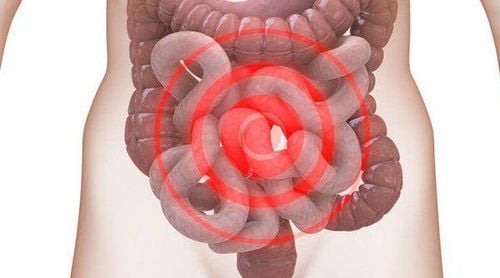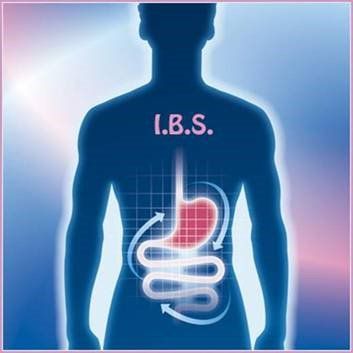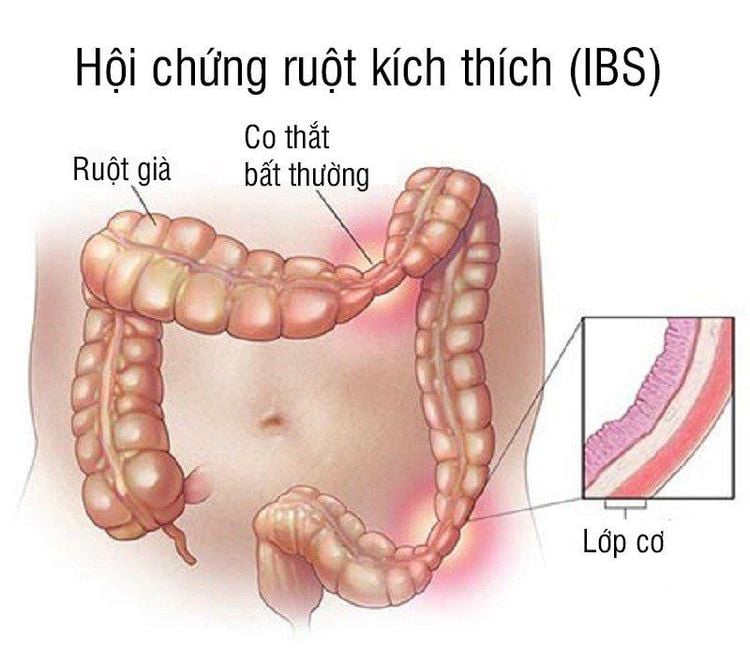This is an automatically translated article.
The article was professionally consulted by Doctor Vo Thi Thuy Trang, Department of Medical Examination & Internal Medicine - Vinmec Danang International General HospitalIrritable bowel syndrome is a type of digestive system disorder. People diagnose this syndrome thanks to a combination of abdominal ultrasound, x-ray, CT tomography...
1. What is irritable bowel syndrome?
Irritable bowel disease is a functional gastrointestinal disorder characterized by abdominal pain and changes in bowel habits without finding any physical damage to the digestive system.Irritable bowel syndrome is a diagnosis of exclusion. There are no specific manifestations of motility disorders or structural disorders of the digestive system, so irritable bowel syndrome remains a disease mainly defined by clinical symptoms.
Irritable bowel syndrome is a chronic disorder that recurs many times every day, every month, every year. If you don't go to the doctor and get proper treatment, it will reduce your quality of life, affect your work, your spirit... Some people with irritable bowel syndrome abstain from too many foods, leading to a lack of quality. nutrition, and some people become anxious and depressed.

2. Diagnostic aids
Colonoscopy is very important that can rule out polyps or cancer, colitis Abdominal ultrasound: Can detect abdominal mass, signs of invasion Computerized tomography (CT) of the abdomen Magnetic resonance test Stool: Find hidden blood in stool, parasites3. Diagnosing Irritable Bowel Disease
3.1. Clinical diagnosis Dysfunction of the digestive system has clinical manifestations expressed through the entire movement of the gastrointestinal tract.The upper part of the digestive tract Reflux esophagitis syndrome, or dyspepsia, the feeling of bloating, abdominal pain, chest tightness.
The lower part of the digestive tract Common symptoms are mainly in the colon such as: Constipation or diarrhea, they cause the colon's activity to be frequently constricted, irritated, or dysfunctional. of the colon.


Supplemental content
Modified criteria Influence of protein nutrition on intestinal digestion Effect of diet in the treatment of constipation, especially in children Rome IV Criterion: IBS Syndrome is a chronic bowel disorder, characterized by recurrent abdominal pain, occurring at least 1 day per week, occurring in the last 3 months and associated with 2 to 3 of the following factors:
Associated with bowel movements Change in frequency of bowel movements Change in stool shape There are 4 models of IBS syndrome:
IBS-constipation (IBS-C) IBS-diarrhea (IBS-D) IBS-mixed (IBS-M) IBS no identification The accompanying diagnostic supporting symptoms:
Abdominal pain, recurrent abdominal pain or abdominal discomfort Abdominal pain in IBS varies greatly in intensity and location, abdominal pain is often pericolon, 25% of patients had pain in the lower abdomen, 20% of patients had pain on the right side, 20% of patients had pain on the left side, and 10% of patients had pain in the epigastrium. Abdominal pain usually subsides after a bowel movement. Recurrent abdominal pain, occurring at least 1 day per week. Detected in the last 3 months with symptom onset at least 6 months prior to diagnosis accompanied by two or more of the following symptoms Certain factors predisposing to abdominal pain: Stress or emotional instability as with work or marital difficulties. Consume foods rich in sugar and fat. In female patients, abdominal pain usually increases during the perimenopause and menarche. Change in bowel habits Change in bowel habits: Most commonly constipation alternates with diarrhea, or diarrhea or constipation predominates. Constipation can last for several weeks or months.
Diarrhea usually has small, loose or loose stools. Diarrhea occurs only during waking hours, usually early in the day, 36% of patients want to have a bowel movement after eating, and over 50% of patients have mucus in their stools. Diarrhea may be aggravated by stress or after eating.
The patient frequently complains of abdominal distension and belching or flatulence.
Other symptoms: Between 25 and 50% of patients have symptoms of dyspepsia, heartburn, nausea and vomiting. There is always a feeling of increased bowel movements.


4. Differential diagnosis of irritable bowel disease with some common diseases
4.1. Irritable Bowel Syndrome with Diarrhea Infected Immune System Rectal and colon cancer Intestinal lymphomas Signs of allergy to certain foods The body lacks lactase enzyme Ulcers bleeding in the rectum, colon Microscopic colonic phenomena Crohn's syndrome 4.2. Irritable bowel syndrome with constipation and abdominal pain Occurrence of a tumor in the colon Enlargement of the colon Occurrence of a tumor in the pancreas Occurrence of lead metal poisoning Occurrence of hernia The body suffers from pouchitis gallstones and gallstones Disorders of porphyrin metabolism
5. Diagnosis with grades of disease
5.1. Mild degree Infrequently symptomatic Few psychological disturbances. Treatment of the syndrome: Basic education about the disease, abstaining from certain foods, only eating foods allowed by the doctor 5.2. Moderate level Frequent occurrence of symptoms, directly affecting normal activities Psychological decline Symptoms with severity of severity, with influencing factors, promoting habits in daily life are changed, Need to apply psychological therapy, apply diet Need to use medicine to control abnormal signs occur 5.3. Severe severity Frequent abdominal pain Psychiatric potential impairment Combined treatment with sedatives or psychotropic drugs Irritable bowel syndrome disrupts the functioning of the digestive system. According to the doctor's diagnosis, the symptoms of mild symptoms such as psychological disturbances, severe, will lead to mental trauma requiring drug support. Therefore, when there are unusual symptoms, patients need to see a doctor to promptly diagnose and develop a treatment plan.
Specialist Doctor I Vo Thi Thuy Trang is trained in gastroenterology, hepatobiliary tract and gastrointestinal endoscopy; continuously updated and received advanced endoscopic training from professors and endoscopy experts from Switzerland and Japan; participated in many domestic and international gastroenterology and endoscopy conferences.
With nearly 20 years of working at Da Nang General Hospital in the field of gastrointestinal endoscopy - hepatobiliary disease, every year, Doctor Vo Thi Thuy Trang participates in endoscopy more than 1500 cases including: endoscopic diagnosis of diseases stomach, colon such as: detecting inflammation, ulcers, polyps, cancer, finding HP bacteria, detecting cancer early in the digestive tract...; Endoscopic treatment such as: Hemostasis in gastrointestinal bleeding, esophageal varices ligation in cirrhosis, endoscopic gastrointestinal polypectomy...
Please dial HOTLINE for more information or register for an appointment HERE. Download MyVinmec app to make appointments faster and to manage your bookings easily.














